Related Research Articles

Flanders is the Dutch-speaking northern portion of Belgium and one of the communities, regions and language areas of Belgium. However, there are several overlapping definitions, including ones related to culture, language, politics, and history, and sometimes involving neighbouring countries. The demonym associated with Flanders is Fleming, while the corresponding adjective is Flemish. The official capital of Flanders is the City of Brussels, although the Brussels-Capital Region that includes it has an independent regional government. The powers of the government of Flanders consist, among others, of economic affairs in the Flemish Region and the community aspects of Flanders life in Brussels, such as Flemish culture and education.

West Flanders is the westernmost province of the Flemish Region, in Belgium. It is the only coastal Belgian province, facing the North Sea to the northwest. It has land borders with the Dutch province of Zeeland to the northeast, the Flemish province of East Flanders to the east, the Walloon province of Hainaut in the southeast and the French department of Nord to the west. Its capital is Bruges (Brugge). Other important cities are Kortrijk in the south and Ostend (Oostende) on the coast, Roeselare and Ypres (Ieper). The province has an area of 3,197 km2 (1,234 sq mi) which is divided into eight administrative districts (arrondissementen) containing 64 municipalities. As of January 2019, West Flanders has a population of 1,195,796.
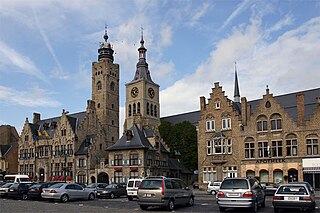
Diksmuide is a Belgian city and municipality in the Flemish province of West Flanders. The municipality comprises the city of Diksmuide proper and the former communes of Beerst, Esen, Kaaskerke, Keiem, Lampernisse, Leke, Nieuwkapelle, Oostkerke, Oudekapelle, Pervijze, Sint-Jacobs-Kapelle, Stuivekenskerke, Vladslo and Woumen.

Vlaams Blok was the name of a Belgian far-right and secessionist political party with an anti-immigration platform. Its ideologies embraced Flemish nationalism, calling for the independence of Flanders. The party originated from split within the Volksunie (VU) party after the right-wing separatist and national conservative wing became disgruntled with the compromise of accepting Belgian federalism over Flemish interests, and what they saw as the VU's move to the left. The former VU members created the Flemish National Party (VNP) and the Flemish People's Party (VVP) which formed an electoral alliance called Vlaams Blok in 1978, before merging to create Vlaams Blok as a political party in 1979. Vlaams Blok was the most notable militant right wing of the Flemish movement and its track record in the Flemish and Belgian parliament elections was strong, making it one of the most successful nationalist parties in Western Europe and it ultimately surpassed the People's Union in support. The party initially focused solely on the issues of Flemish autonomy and political freedom, which remained its core philosophy, but subsequently gained wider public support through broadening its campaigns to include immigration and law-and-order themes.

The New Flemish Alliance is a Flemish nationalist and conservative political party in Belgium. The party was founded in 2001 by the right-leaning fraction of the centrist-nationalist People's Union (VU).

The Flemish Movement is an umbrella term which encompasses various political groups in the Belgian region of Flanders and, less commonly, in French Flanders. Ideologically, it encompasses groups which have sought to promote Flemish culture and Dutch language as well as those seeking greater political autonomy for Flanders within Belgium. It also encompassed nationalists who seek the secession of Flanders from Belgium, either through outright independence or unification with the Netherlands.
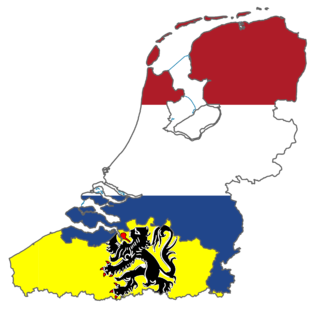
Greater Netherlands is an irredentist concept which unites the Netherlands, Flanders, and sometimes Brussels. Additionally, a Greater Netherlands state may include the annexation of the French Westhoek, Suriname, formerly Dutch-speaking areas of Germany and France, or even the ethnically Dutch and/or Afrikaans-speaking parts of South Africa, though such variants are mostly limited to far-right groups. A related proposal is the Pan-Netherlands concept, which includes Wallonia and potentially also Luxembourg.
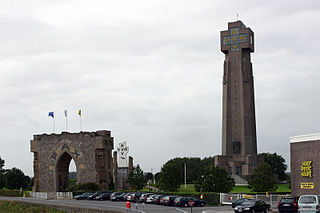
The Yser Pilgrimage is an annual gathering at the Yser Tower (IJzertoren) in Diksmuide, West Flanders in Belgium. This pilgrimage remembers the Flemish soldiers who died while serving in the Belgian Army during the First World War and was first organised in 1920. Initially influenced by pacifism, it became increasingly associated with the Flemish Movement. It is at the same time a political meeting striving for Flemish political autonomy. The aims of the annual meeting are "No More War", "Autonomy" and "Truce of God".

The Yser Towers are a monument complex near the Yser river at Diksmuide, West Flanders in Belgium. The first tower was built in 1928–30 to commemorate the Belgian soldiers killed on the surrounding Yser Front during World War I and as a monument to Christian pacifism. However, it subsequently became an important political symbol for the Flemish Movement and was destroyed in 1946 as a result of its association with Flemish nationalist collaboration in German-occupied Belgium in World War II. The current tower was rebuilt alongside the remains of the original and copied its design. It was finished in 1965. It remains a site of political significance to Flemish nationalists and is the center for their annual Yser Pilgrimage (IJzerbedevaart).

Het Laatste Nieuws is a Dutch-language newspaper based in Antwerp, Belgium. It was founded by Julius Hoste Sr. on 7 June 1888. It is now part of DPG Media, and is the most popular newspaper in Flanders and Belgium.
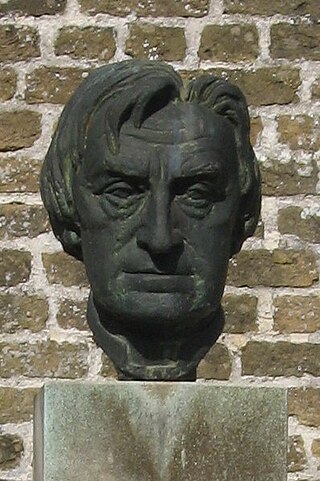
Cyriel Verschaeve was a Flemish nationalist priest and writer who collaborated with the Nazis during the Second World War. He was recognised as the spiritual leader of Flemish nationalism by the ideology's adherents and a Nazi propagandist.
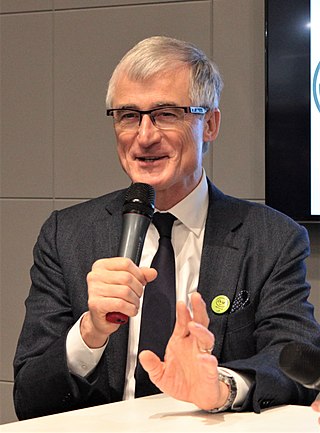
Geert Albert Bourgeois is a Belgian politician of the New Flemish Alliance (N-VA), which he founded in 2001, who is currently serving as a Member of the European Parliament since 2019. He previously served as the Minister-President of Flanders from 2014 to 2019. Prior to this, he was a member of the federal Chamber of Representatives for the People's Union from 1995 to 2001, and then for the N-VA from 2001 to 2004. He has been involved in local and regional politics in Flanders since 1976.
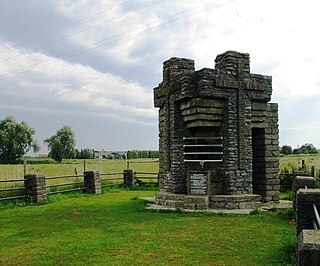
Edward and Frans Van Raemdonck were two siblings killed while serving in the Belgian Army in World War I whose story subsequently became prominent within the popular memory of the conflict in post-war Flanders.
The 2007–2008 Belgian government formation followed the general election of 10 June 2007, and comprised a period of negotiation in which the Flemish parties Flemish Liberal Democratic, Christian Democratic and Flemish (CD&V) and New Flemish Alliance (N-VA), and the French-speaking parties Reformist Movement (MR), Democratic Front of Francophones (FDF) and Humanist Democratic Centre (CdH) negotiated to form a government coalition. The negotiations were characterized by the disagreement between the Dutch- and French-speaking parties about the need for and nature of a constitutional reform. According to some, this political conflict could have led to a partition of Belgium.
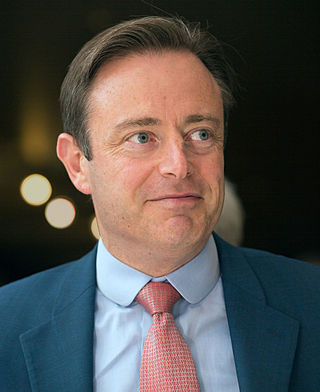
Bart Albert Liliane De Wever is a Belgian politician. Since 2004, De Wever has been the leader of the New Flemish Alliance (N-VA), a political party advocating for the independence of Flanders. He is also a member of the Chamber of Representatives. De Wever played a prominent role in the 2007 Belgian government formation and presided over his party's victory in the 2010 federal elections when N-VA became the largest party in both Flanders and in Belgium as a whole.
Fredegardus Jacobus Josephus (Jef) van de Wiele was a Belgian Flemish Nazi politician. During the Nazi occupation of Belgium he became notorious as the leader of the most virulently pro-Nazi wing of Flemish politics.

August Borms was a Flemish nationalist politician active in Belgium during the first half of the twentieth century. He belonged to the far-right of the Flemish movement. Borms collaborated with Germany during both the First and Second World Wars and was sentenced to death at the end of each conflict. He was not however executed until 1946, having had his sentence quashed the first time.
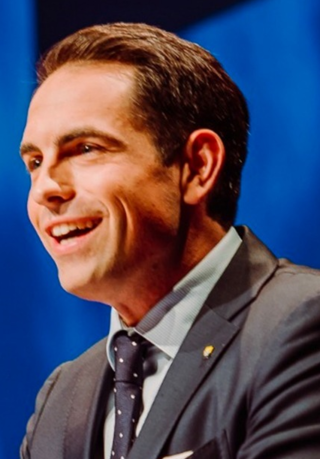
Tom Jozef Irène Van Grieken is a Belgian politician and author who has served as leader of Vlaams Belang since October 2014.

Pan-Netherlands, sometimes translated as Whole-Netherlands, is an irredentist concept which aims to unite the Low Countries into a single state. It is an example of Pan-Nationalism.
References
- ↑ IJzerwake a sign of independence, De Tijd,August 24, 2008
- ↑
- IJzerwake calls for unilateral independence, Het Laatste Nieuws, 24/08/08